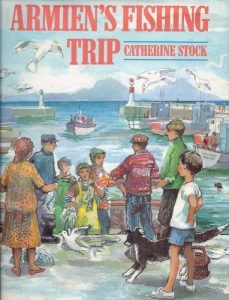 While visiting his aunt and uncle in the little South African village of Kalk Bay, Armien stows away in his uncle’s fishing boat and becomes an unexpected hero.
While visiting his aunt and uncle in the little South African village of Kalk Bay, Armien stows away in his uncle’s fishing boat and becomes an unexpected hero.
South Africa
Materials from South Africa
The Herd Boy
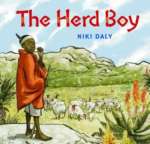
While doing a good job of caring for his grandfather’s sheep and goat on the grasslands of South Africa, young Malusi dreams of everything from owning his own dog to becoming president one day.
Featured in Volume VI, Issue 1 of WOW Review.
Blood Runner: The Long Race to Freedom
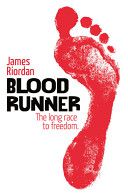
Samuel’s parents and young sister, innocent bystanders during an uprising, are killed by South African police. Samuel is sent to live with his uncle, a tribal chief in the Bantu homeland, while his brother vows to join the African National Congress armed struggle and avenge his family’s deaths. In the homeland, Samuel discovers he can run faster than anyone and before long begins to train under his English-educated uncle. Years later, after the end of Apartheid, Samuel is selected as the token black South African athlete to run in the Olympics. President Nelson Mandela is there when he wins his gold medal, and Samuel dedicates it to ‘a very special man… I was running for the President. I was running for my country. This powerful and moving story portrays what it was like for blacks growing up in South Africa aunder Apartheid and the different ways in which they struggled to gain their freedom. For some, like Samuel’s brother, it was an armed struggle, but for Samuel it was the opportunity to prove he could run better than any white man.
Little Lion
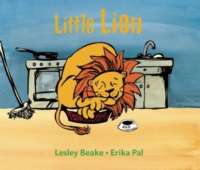
One day, Dad comes home with a lion. “Brought you a dog,” says Dad. Mum and the children don’t believe him, but they call it Dog, let it sleep in the dog basket, and keep quiet about their strange, noisy pet. But Big Jonno, the school bully, is curious, and tries to make life tough, until one day, the worst thing happens — the Lion escapes and finds Big Jonno.This delightfully surreal story by a multi-award-winning author and talented illustrator — in which a bully gets his just deserts — will keep young readers guessing all the way through! The inspiration for this story came from the Bleek-Lloyd collection of stories written down by the linguists Wilhelm Bleek, his daughter Jemima and his sister-in-law Lucy Lloyd when they were recording the language and stories of the |Xam* people of the Northern Cape in South Africa.The original story doesn’t have a middle or an end, but it has a very funny beginning when a man brings a lion home and tells his wife it’s a dog.
Desmond and the Very Mean Word
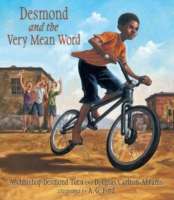
When Desmond takes his new bicycle out for a ride through his neighborhood, his pride and joy turn to hurt and anger when a group of boys shout a very mean word at him. He first responds by shouting an insult, but soon discovers that fighting back with mean words doesn’t make him feel any better. With the help of kindly Father Trevor, Desmond comes to understand his conflicted feelings and see that all people deserve compassion, whether or not they say they are sorry. Brought to vivid life in A. G. Ford’s energetic illustrations, this heartfelt, relatable story conveys timeless wisdom about how to handle bullying and angry feelings, while seeing the good in everyone.
Next Stop–Zanzibar Road!
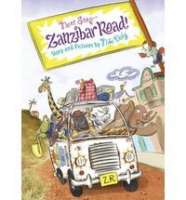
In Africa, Mama Jumbo puts on a jazzy dress, struggles to get her hat straight with no mirror, then jumps in Mr. Motiki’s taxi to go to the market, where she finds everything she needs and more.
Now Is the Time for Running
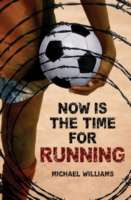
Just down the road from their families, Deo and his friends play soccer in the dusty fields of Zimbabwe, cheered on by Deo’s older brother, Innocent. It is a day like any other . . . until the soldiers arrive and Deo and Innocent are forced to run for their lives, fleeing the wreckage of their village for the distant promise of safe haven. Along the way, they face the prejudice and poverty that await refugees everywhere, and must rely on the kindness of people they meet to make it through. But when tragedy strikes, Deo’s love of soccer is all he has left. Can he use that gift to find hope once more? Relevant, timely, and accesibly written, Now Is the Time For Running is a staggering story of survival that follows Deo and his mentally handicapped older brother on a transformative journey that will stick with readers long after the last page.
See the review at WOW Review, Volume IV, Issue 4
When the Sea Is Rising Red
After seventeen-year-old Felicita’s dearest friend Ilven kills herself to escape an arranged marriage, Felicita chooses freedom over privilege. She fakes her own death and leaves her sheltered life as one of Pelimburg’s magical elite behind. Living in the slums, scrubbing dishes for a living, she falls for charismatic Dash while also becoming fascinated with vampire Jannik. Then something shocking washes up on the beach: Ilven’s death has called out of the sea a dangerous wild magic. Felicita must decide whether her loyalties lie with the family she abandoned . . . or with those who would twist this dark power to destroy Pelimburg’s caste system, and the whole city along with it.
J. R. R. Tolkien
John Ronald Reuel Tolkien’s novels were strongly influenced by his childhood both in South Africa, where lions prowled and wild beasts roamed, and in the English countryside, where he imagined that elves and gnomes dwelled. J. R. R. Tolkien wrote many stories, studied languages–even inventing one of his own–and founght bravely in World War I. He wrote The Hobbit, a children’s book about a courageous creature with pointed ears and furry feet, which was an instant success. His next book, The Lord of the Rings, made Tolkien, an ordinary man with an extraordinary imagination, one of the world’s most beloved authors.
This for That
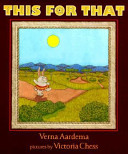
Rabbit tricks the other animals of the African plain into giving her food and other treats.
